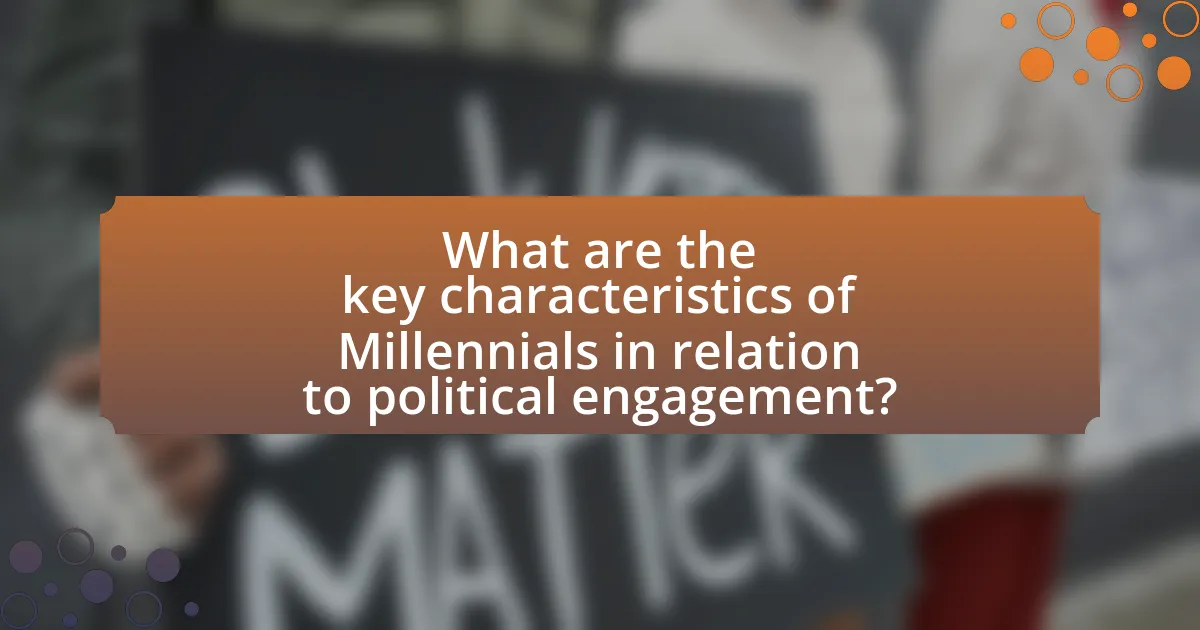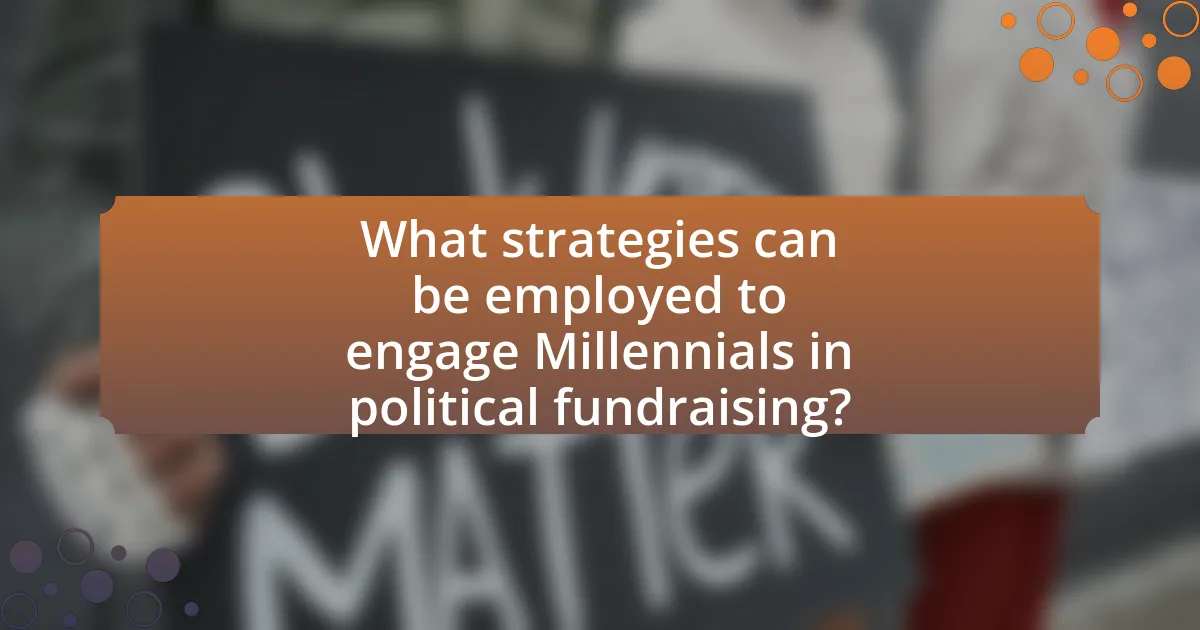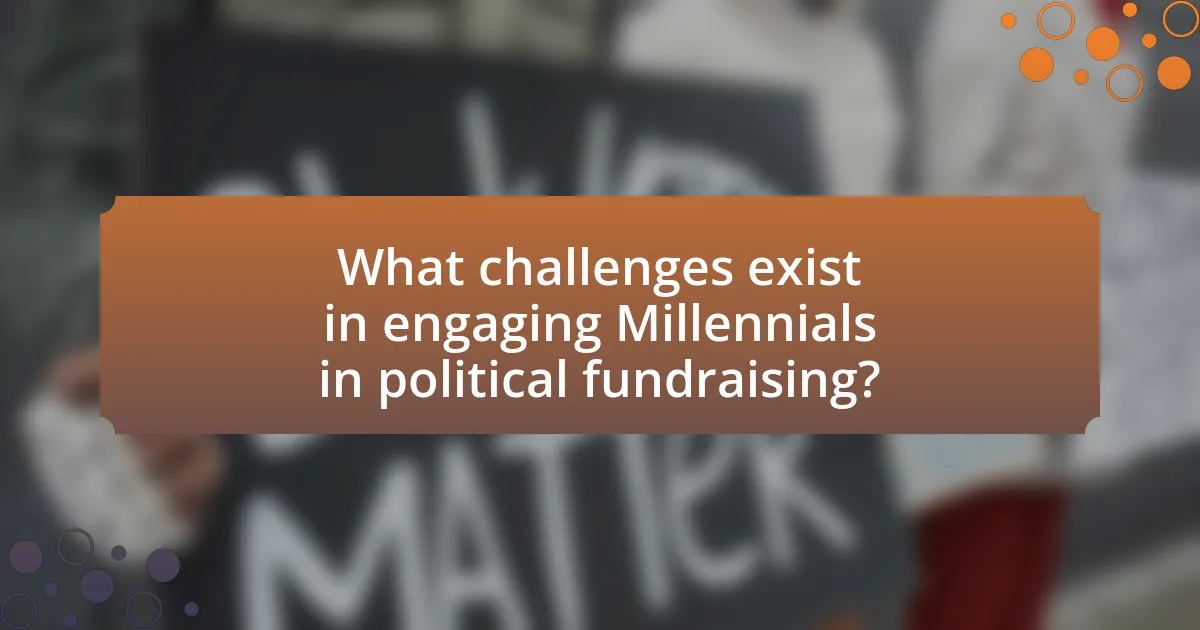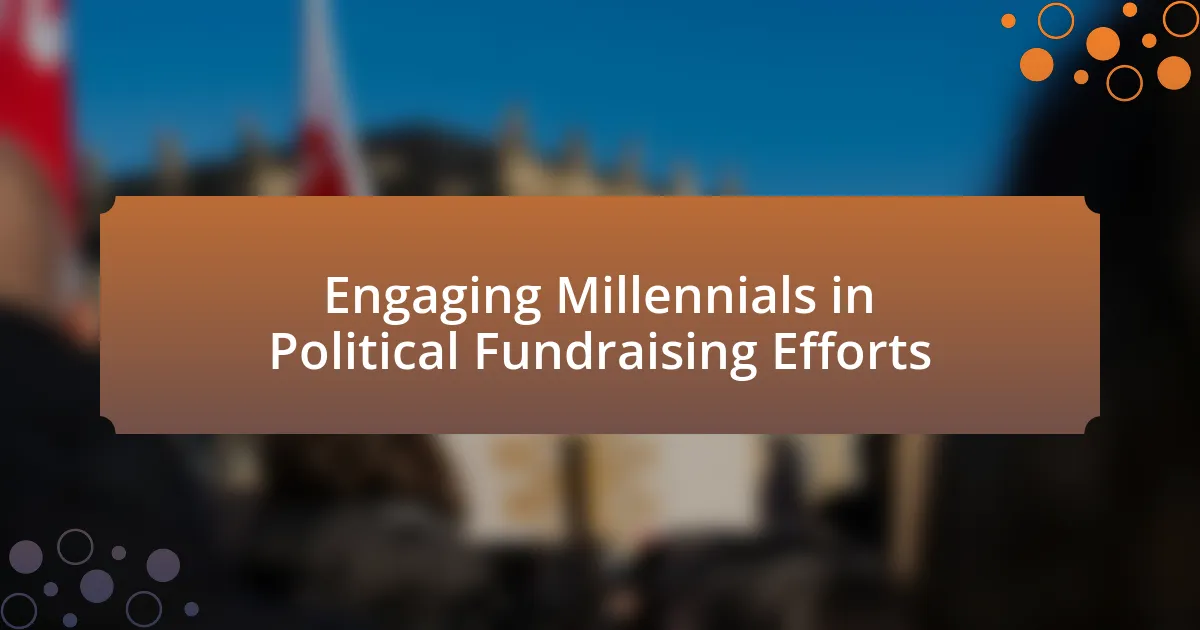The article focuses on engaging Millennials in political fundraising efforts, highlighting their unique characteristics and preferences in political engagement. Key aspects include their reliance on digital activism, prioritization of social justice issues, and demand for authenticity in political messaging. The article explores Millennials’ perceptions of political fundraising, their motivations for donating, and the influence of social media on their engagement. Additionally, it addresses challenges faced by organizations in reaching this demographic, such as skepticism towards traditional political institutions and financial constraints, while offering strategies to enhance trust and participation through transparency, community involvement, and effective use of digital platforms.

What are the key characteristics of Millennials in relation to political engagement?
Millennials exhibit key characteristics in political engagement, including high levels of digital activism, a preference for social justice issues, and a tendency to prioritize authenticity in political messaging. Research indicates that 70% of Millennials are more likely to engage in political activities through social media platforms, reflecting their comfort with technology and online communication. Additionally, studies show that Millennials are motivated by issues such as climate change, racial equality, and healthcare reform, which they view as critical to their future. Furthermore, they often seek transparency and genuine connections with political candidates, valuing leaders who demonstrate integrity and align with their values.
How do Millennials perceive political fundraising?
Millennials generally perceive political fundraising as a necessary but often frustrating aspect of the political process. This generation is increasingly skeptical of traditional fundraising methods, viewing them as disconnected from their values and priorities. According to a 2020 survey by the Pew Research Center, 70% of Millennials believe that money has too much influence in politics, indicating a strong concern about the role of fundraising in shaping political agendas. Additionally, Millennials prefer grassroots fundraising efforts that emphasize transparency and community engagement over large donations from wealthy individuals or corporations. This preference reflects their desire for authenticity and accountability in political campaigns.
What factors influence Millennials’ willingness to donate?
Millennials’ willingness to donate is influenced by factors such as social media engagement, personal values, and transparency of organizations. Research indicates that 70% of Millennials prefer to donate to causes that align with their personal beliefs and values, emphasizing the importance of authenticity in fundraising efforts. Additionally, a study by the Millennial Impact Project found that 84% of Millennials are more likely to donate if they see their peers engaging in charitable activities on social media, highlighting the role of social influence. Furthermore, transparency regarding how donations are used significantly impacts their decision to contribute, with 90% of Millennials stating they want to know how their money will make a difference.
How does social media impact Millennials’ engagement in fundraising?
Social media significantly enhances Millennials’ engagement in fundraising by providing platforms for easy sharing and communication. Research indicates that 84% of Millennials are more likely to donate to causes they see promoted on social media, as these platforms facilitate peer influence and community building. Additionally, social media allows for real-time updates and interactions, which can increase transparency and trust in fundraising efforts, leading to higher participation rates among this demographic.
What motivates Millennials to participate in political campaigns?
Millennials are motivated to participate in political campaigns primarily by a desire for social change and civic engagement. This generation often seeks to address issues such as climate change, social justice, and economic inequality, which they perceive as critical challenges. Research indicates that 70% of Millennials believe that political participation is essential for creating meaningful change in society. Additionally, the use of social media platforms facilitates their engagement, allowing them to connect with like-minded individuals and mobilize support for causes they care about. This combination of a strong value system and accessible communication channels drives their active involvement in political campaigns.
How do personal values shape their political contributions?
Personal values significantly shape political contributions by influencing individuals’ priorities and the causes they support. For instance, millennials often prioritize social justice, environmental sustainability, and equality, leading them to contribute to candidates and organizations that align with these values. Research indicates that 70% of millennials are more likely to support political campaigns that reflect their personal beliefs, demonstrating a direct correlation between values and financial support. This alignment not only drives funding but also mobilizes grassroots efforts, as individuals are more likely to engage in activism and fundraising for causes they are passionate about.
What role does peer influence play in their fundraising efforts?
Peer influence significantly enhances fundraising efforts among Millennials by leveraging social connections to motivate contributions. Research indicates that Millennials are more likely to donate when they see their peers participating in fundraising activities, as social validation and collective action resonate strongly with this demographic. A study by the Millennial Impact Project found that 84% of Millennials are influenced by their friends’ charitable activities, demonstrating that peer engagement can lead to increased participation and higher donation amounts. This social dynamic not only fosters a sense of community but also amplifies the reach and effectiveness of fundraising campaigns targeting Millennials.

What strategies can be employed to engage Millennials in political fundraising?
To engage Millennials in political fundraising, organizations should leverage digital platforms and social media to create interactive and personalized experiences. Research indicates that 70% of Millennials prefer to engage with causes through social media, making platforms like Instagram and TikTok effective for outreach. Additionally, incorporating gamification elements, such as challenges or rewards for donations, can enhance participation, as studies show that gamified experiences increase engagement by up to 50%. Furthermore, transparency in how funds are used resonates with Millennials, who value authenticity; 84% of this demographic are more likely to support organizations that demonstrate clear impact.
How can technology enhance fundraising efforts targeting Millennials?
Technology can enhance fundraising efforts targeting Millennials by leveraging digital platforms for engagement and donation processes. Millennials are highly active online, with 85% using social media, which allows organizations to reach them through targeted campaigns on platforms like Instagram and Facebook. Additionally, mobile payment solutions, such as Venmo and PayPal, facilitate quick and easy donations, aligning with Millennials’ preference for convenience. A study by the Pew Research Center indicates that 70% of Millennials prefer to donate online, highlighting the effectiveness of digital fundraising strategies. Furthermore, utilizing data analytics enables organizations to personalize outreach, increasing the likelihood of donations by tailoring messages to individual preferences and behaviors.
What digital platforms are most effective for reaching Millennials?
Social media platforms, particularly Instagram, Facebook, and TikTok, are the most effective for reaching Millennials. These platforms have high engagement rates among this demographic, with 71% of Millennials using Instagram and 70% using Facebook regularly. TikTok has rapidly gained popularity, with 60% of its users aged between 16 and 24, making it a crucial platform for engaging younger Millennials. Additionally, a study by the Pew Research Center indicates that 84% of Millennials are active on social media, highlighting its importance in digital outreach strategies.
How can mobile apps facilitate donations from Millennials?
Mobile apps can facilitate donations from Millennials by providing a seamless, user-friendly platform that integrates social sharing, gamification, and real-time tracking of fundraising goals. These features resonate with Millennials’ preferences for convenience and engagement, as evidenced by a 2021 study from the Pew Research Center, which found that 90% of Millennials use smartphones, making mobile accessibility crucial for donation platforms. Additionally, apps that allow for quick, one-click donations and personalized messaging can enhance the likelihood of contributions, as Millennials are more inclined to support causes that align with their values and are presented in an engaging manner.
What messaging resonates with Millennials during fundraising campaigns?
Messaging that resonates with Millennials during fundraising campaigns emphasizes authenticity, social impact, and community involvement. Millennials are drawn to messages that highlight transparency and the tangible outcomes of their contributions, such as specific projects or initiatives that address social issues. Research indicates that 70% of Millennials prefer to support causes that align with their values and demonstrate a clear impact, making it essential for campaigns to communicate how donations will create meaningful change. Additionally, incorporating storytelling that reflects personal experiences and relatable narratives can enhance engagement, as Millennials respond positively to emotional connections and shared values.
How can authenticity and transparency be communicated effectively?
Authenticity and transparency can be communicated effectively through consistent messaging and open dialogue. Organizations should share their values and mission clearly, ensuring that all communications reflect these principles. For instance, using social media platforms to provide real-time updates and behind-the-scenes insights fosters a sense of trust. Research indicates that 86% of consumers consider transparency important when deciding which brands to support, highlighting the necessity for organizations to be open about their processes and decision-making. By actively engaging with their audience and addressing concerns directly, organizations can build credibility and strengthen relationships with millennials in political fundraising efforts.
What storytelling techniques engage Millennials emotionally?
Storytelling techniques that engage Millennials emotionally include authenticity, relatability, and interactivity. Authenticity resonates with Millennials, as they prefer genuine narratives that reflect real experiences and values. Relatable characters and situations foster a personal connection, making the story more impactful. Interactivity, such as allowing audiences to participate in the narrative or share their own stories, enhances emotional engagement. Research by the Pew Research Center indicates that 70% of Millennials value authenticity in brands, highlighting the importance of these techniques in effectively reaching this demographic.

What challenges exist in engaging Millennials in political fundraising?
Engaging Millennials in political fundraising faces several challenges, primarily due to their skepticism towards traditional political institutions and fundraising methods. Research indicates that Millennials prioritize authenticity and transparency, making them less responsive to conventional fundraising appeals that lack personal connection or relatable messaging. Additionally, a 2020 study by the Pew Research Center found that only 28% of Millennials trust the government, which directly impacts their willingness to contribute financially to political campaigns. Furthermore, Millennials often prefer digital engagement over in-person events, necessitating campaigns to adapt their strategies to online platforms, which can be resource-intensive and complex. These factors collectively hinder effective engagement with this demographic in political fundraising efforts.
What barriers do Millennials face when contributing to political causes?
Millennials face several barriers when contributing to political causes, primarily including financial constraints, lack of trust in political institutions, and limited access to information. Financial constraints are significant, as many Millennials are burdened with student debt and high living costs, which restrict their disposable income for donations. A 2020 survey indicated that 70% of Millennials reported financial instability as a barrier to political contributions. Additionally, a pervasive lack of trust in political institutions leads to skepticism about the impact of their contributions, with 60% of Millennials expressing doubts about whether their donations would lead to meaningful change. Lastly, limited access to information about political causes and candidates can hinder their engagement, as many Millennials rely on social media for news, which may not always provide comprehensive or accurate information.
How does student debt impact their ability to donate?
Student debt significantly reduces the ability of individuals to donate. According to a report by the Federal Reserve, as of 2021, approximately 43 million Americans owe over $1.7 trillion in student loan debt, which constrains their disposable income and financial flexibility. This financial burden often leads to prioritizing essential expenses over charitable contributions, resulting in lower donation rates among those with high student debt compared to their debt-free counterparts.
What skepticism do Millennials have towards political organizations?
Millennials exhibit skepticism towards political organizations primarily due to perceived dishonesty and lack of transparency. Many Millennials believe that political organizations prioritize their own interests over those of the public, leading to distrust. According to a 2019 survey by the Pew Research Center, 70% of Millennials expressed that they feel political leaders are out of touch with their needs, reinforcing their skepticism. Additionally, the rise of social media has made Millennials more aware of political misinformation, further contributing to their doubts about the integrity of political organizations.
How can organizations overcome these challenges?
Organizations can overcome challenges in engaging Millennials in political fundraising efforts by leveraging digital platforms and social media to create interactive and relatable content. Research indicates that 70% of Millennials prefer to engage with brands through social media, making it a crucial channel for outreach. By utilizing targeted campaigns that resonate with Millennial values, such as social justice and environmental sustainability, organizations can foster a sense of community and encourage participation. Additionally, incorporating gamification elements into fundraising initiatives can enhance engagement, as studies show that gamified experiences increase participation rates by up to 50%.
What best practices can be implemented to build trust with Millennials?
To build trust with Millennials, organizations should prioritize transparency and authenticity in their communications. Millennials value honesty and are more likely to engage with brands or causes that openly share their mission, values, and the impact of their actions. According to a 2020 study by the Edelman Trust Barometer, 81% of Millennials stated that they need to be able to trust the brand to do what is right. Additionally, fostering community involvement and encouraging feedback can enhance trust, as Millennials appreciate being part of a collaborative effort. Engaging them through social media platforms, where they can see real-time updates and interact directly, further solidifies this trust-building process.
How can organizations create inclusive fundraising environments?
Organizations can create inclusive fundraising environments by implementing diverse outreach strategies that engage various demographic groups. This includes tailoring messaging to resonate with different communities, ensuring representation in leadership roles, and actively seeking input from diverse stakeholders. Research indicates that organizations with diverse teams are 35% more likely to outperform their peers, highlighting the importance of inclusivity in driving success. Additionally, fostering a culture of transparency and accountability can enhance trust and participation among potential donors from varied backgrounds.
What are the best practices for engaging Millennials in political fundraising?
The best practices for engaging Millennials in political fundraising include leveraging digital platforms, emphasizing transparency, and fostering community involvement. Digital platforms such as social media and crowdfunding sites are essential, as 85% of Millennials use these channels for political engagement. Transparency in financial reporting and campaign goals builds trust, with 70% of Millennials valuing honesty in political communications. Additionally, creating opportunities for community involvement, such as volunteer events or grassroots campaigns, resonates with Millennials, who prioritize social impact and collective action. These strategies align with Millennials’ preferences for authentic engagement and participatory experiences in political fundraising.
How can organizations leverage social media for effective outreach?
Organizations can leverage social media for effective outreach by creating targeted content that resonates with their audience, particularly Millennials. By utilizing platforms like Instagram, Twitter, and Facebook, organizations can engage users through interactive posts, live events, and storytelling that highlights their mission and values. Research indicates that 90% of Millennials use social media, making it a crucial channel for reaching this demographic. Additionally, organizations can use analytics tools to track engagement metrics, allowing them to refine their strategies based on real-time feedback and preferences. This data-driven approach ensures that outreach efforts are both relevant and impactful, ultimately enhancing fundraising initiatives.
What role do events play in fostering Millennial engagement?
Events play a crucial role in fostering Millennial engagement by providing interactive and immersive experiences that resonate with their values and preferences. These gatherings create opportunities for social interaction, networking, and community building, which are essential for Millennials who prioritize connection and authenticity. Research indicates that 70% of Millennials prefer experiences over material goods, highlighting their inclination towards events that offer meaningful engagement. Additionally, events can serve as platforms for advocacy and activism, aligning with Millennials’ desire to support causes they care about, thus enhancing their emotional investment in political fundraising efforts.
